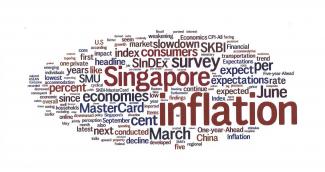
SINGAPORE, 15 April 2020 (Wednesday) - These are the research findings of the 35th round of quarterly release for the DBS-SKBI Singapore Index of Inflation Expectations (SInDEx) Survey at the Sim Kee Boon Institute for Financial Economics (SKBI), Singapore Management University (SMU).
- In this survey, we introduced two new ad-hoc questions related to COVID-19, asking respondents for their view on its likely effects on the Singapore economy and inflation expectations. Note that the reference period for the survey was March 20 to 31, which included the announcements of the “Resilience Budget” (March 26) and MAS policy decision (March 30), but prior to the outset of the “circuit breaker” period and “Solidarity Budget”.
- The majority of survey respondents (roughly 60%) generally expects the COVID-19 situation to have a “moderate impact” on both the Singapore economy and household inflation expectations, with the effects perhaps lasting “around one year."
- One-year-Ahead headline inflation expectations edged down to 3.1% in March 2020, from 3.2% in December 2019, slightly down compared to 2012-19 first quarter average of 3.4%.
- The overall CPIEx Inflation Expectations, after adjusting for potential behavioral biases and re-combining across components, eased to 2.9% in March 2020 compared to 3.0% in December 2019.
- Excluding accommodation and private road transportation related costs, the One-year-Ahead Core CPIEx inflation expectations corrected to 3.1% in March 2020 compared to 3.4% in December 2019.
- For a subgroup of the population who own their accommodation and use public transport, the One-year-Ahead CPIEx core inflation expectations pared to 2.9% in March 2020 from 3.0% in December 2019. Not being exposed to private road transportation or accommodation expenses, this subgroup’s expectations of core inflation closely resemble the Singapore Core Inflation Expectations.
- The one-year-ahead composite index SInDEx1, that puts less weight on more volatile components like accommodation, private transport, food and energy, polled at 3.1% in March 2020 compared to 3.2% in the December 2019 SInDEx survey, below the 2012-2019 first quarter average of 3.4%.
- Around 57% believe the impact on inflation from COVID-19 would be in the medium term (or around 12 month ahead) but about 30% believe it might have a longer term (or around five year ahead) impact on inflation.
- In addition, around 10% of Singaporeans expect that there will be a 10% or more reduction in salary in the next 12 months, even though the median salary increment expectation is close to zero. However, the perception of 10% or more drop in their personal income over next 12 months does not seem to be associated with their view on the impact on COVID-19.
DBS Chief Economist and Managing Director of Group Research, Dr. Taimur Baig commented, “Surveys of expectations are the most valuable at times like these, with a global pandemic affecting jobs, wages, and the overall outlook. Faced with deflationary shocks and employment/income insecurities, survey responses will portray vividly the downside to prices and sentiments going forward. The latest survey shows a marginal easing of expectations, perhaps indicating incomplete passthrough of global oil price decline at local pumps, as well as lingering hopes of a deep but short contraction in activities. We are sure the next round of survey will offer insights more in line with expectations of weaker demand and prices.”
SMU Professor and SKBI Director Dave Fernandez noted that “While most expect the COVID-19 situation to have a ‘moderate impact’ on the domestic economy and household inflation expectations, Singapore, like other small and trade-dependent economies, will likely be more susceptible to the negative economic effects from the pandemic. In addition, the combination of demand destruction and supply disruption as a result of COVID-19 further complicates the current situation.”
SKBI Principal Research Associate Thomas Lam underscored that “Interestingly, the proportion of surveyed Singaporean households leaning toward the pandemic having a ‘significant’ and ‘longer-term’ imprint--approximately 25% to 30% of respondents--is more than double those expecting it to fade quickly with trivial effects.”
For the longer horizon, the Five-year-Ahead CPIEx inflation expectations in the March 2020 survey stayed unchanged at 4.1% compared to December 2019. The current polled number is lower than the 2012–2019 first quarter average of 4.3%.
The Five-year-Ahead CPIEx core inflation expectations (excluding accommodation and private road transportation related costs) inched up from 3.6% in December 2019 to 3.7% in March 2020. Overall, the composite Five-year-Ahead SInDEx5 inched up to 3.9% in March 2020 from 3.8% in December 2019. In comparison the 2012–2019 first quarter average value of the composite Five-year-Ahead SInDEx5 was at 4.1%.
SMU Assistant Professor of Finance and founding Principal Investigator of the DBS-SKBI SInDEx Project, Aurobindo Ghosh observed, “The global economy seems to be going through a generational event, exacerbated by oil price wars by Saudi Arabia and Russia which has abated recently with an agreement to reduce supply. As a small open economy, Singapore will feel the brunt of these in its growth outlook. However, in terms of overall inflations expectations, Singaporeans polled seem to have a collective cognitive dissonance. The median term or One-year-Ahead inflation expectations corrected downwards slightly across the board, but the short term supply crunch provided some resistance in lowering inflation expectations. The long term or Five-year-Ahead expectations stayed largely unchanged owing mainly to the global uncertainty, the massive stimulus spending and the recent oil price slump. These results signal some levels of anchoring of inflation expectations of Singaporeans who are cautiously optimistic of a V-shaped recovery and normalization of the dislocated supply chain.”